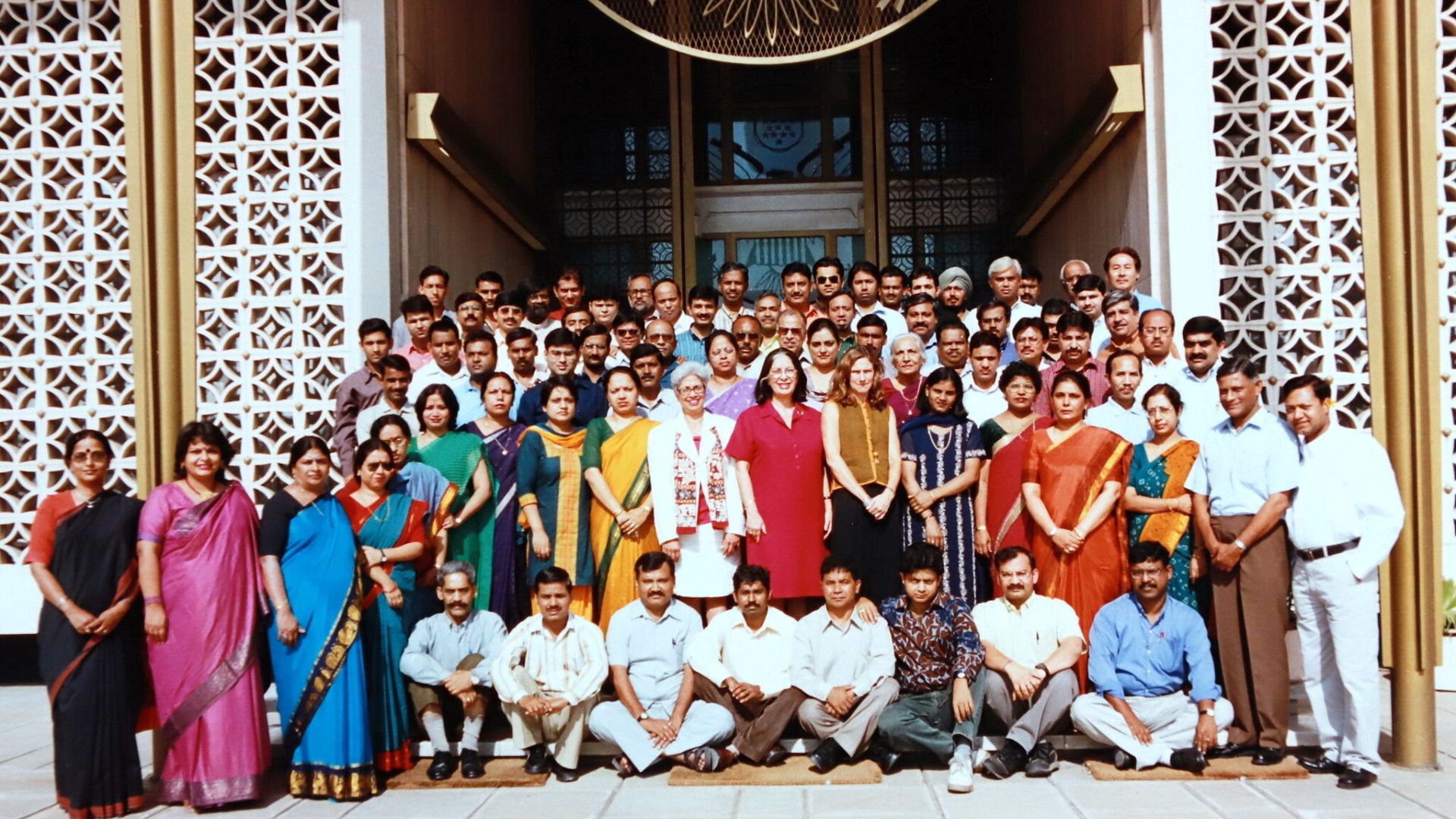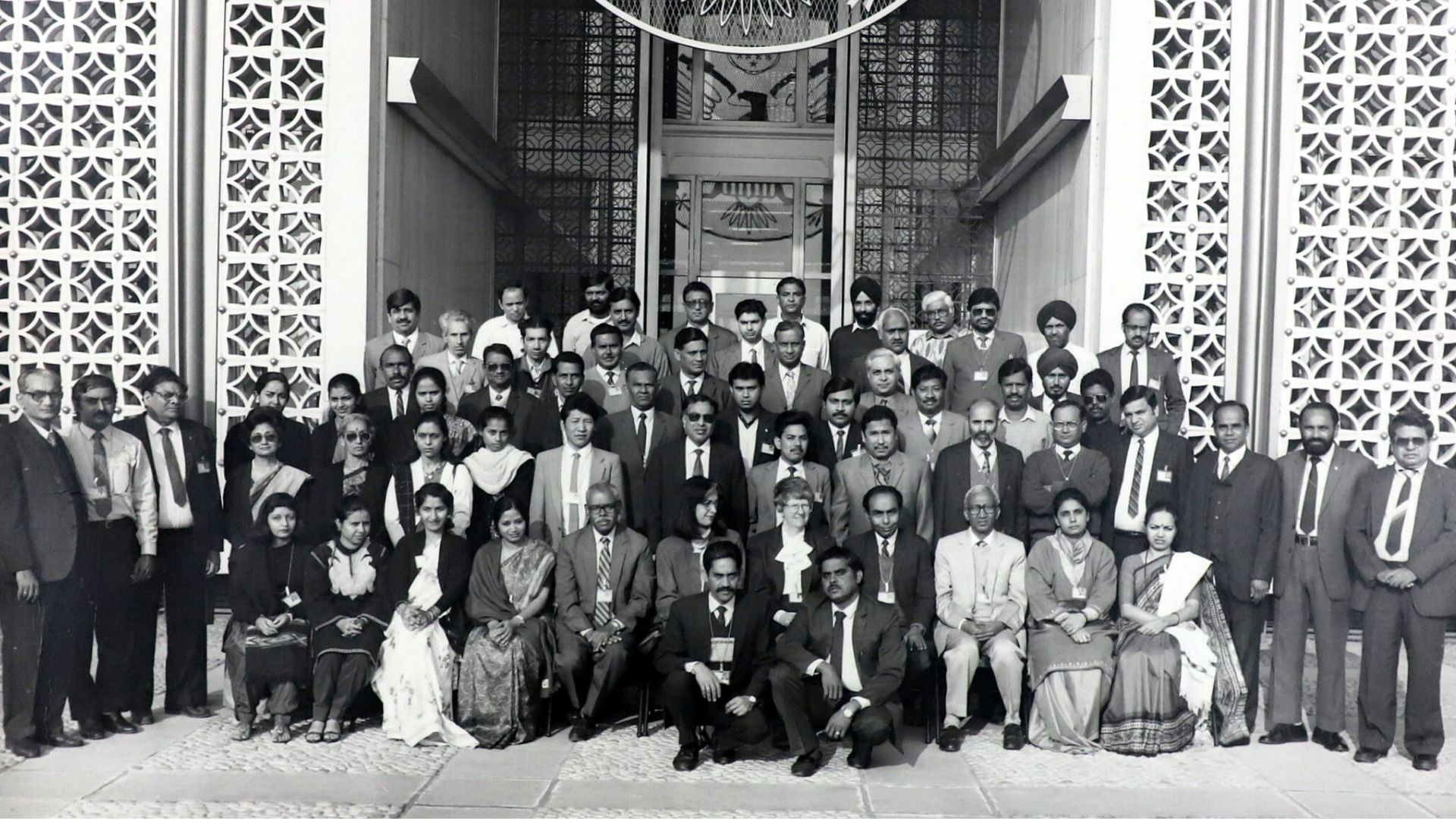New Delhi's Overseas Operations Field Office acquires, catalogues and distributes library materials from South Asia to researchers globally.
September 2023

The New Delhi Field Office staff in 2003. (Photograph courtesy Library of Congress New Delhi Field Office)
The Overseas Operations Field Office in New Delhi has just celebrated its 60th anniversary. Founded in 1962 as the first Library of Congress Overseas Operations Field Office, the New Delhi Field Office and its staff have led the way in exemplary practices of identifying, acquiring, cataloging, and distributing library materials from South Asia used by researchers all over the United States, as well as those located beyond our nation’s borders.
The establishment of the New Delhi Field Office followed on the heels of, and overlapped with, the United States Public Law (PL) 480 Program—otherwise known as the Agricultural Trade Development and Assistance Act of 1954. In India, the program started out as PL 48 (the India Emergency Assistance Act of 1950) for the purpose of food aid and later transitioned into the PL 480 in 1954. This program operated until 1969 across Asia and the Middle East and supported the development of Area Studies programs in universities across the United States, and the library collections to support the new scholars in these programs. It was initially started as a way to move surplus grain in post-World War II America to other parts of the world experiencing a deficit of food. In exchange, countries involved in the program were allowed to pay in local currency. This local currency was eventually used to purchase local books and other printed materials for universities in the United States. President Eisenhower renamed PL 480 to the Food for Peace program, pointing to the supposed foreign diplomatic gains to be had with non-aligned countries in the midst of the Cold War.
Before the office moved out from under the purview of PL 480, the office was called the American Libraries Book Procurement Center, New Delhi. “Accessions lists,” such as this one from New Delhi, contain the titles of the books, magazines and newspapers acquired for the program. The New Delhi Field Office was previously responsible for procuring books from all of South Asia (India, Pakistan, Bangladesh, Bhutan, Nepal, Sri Lanka and Maldives). It worked closely with offices in Karachi and Dhaka, which were founded in 1962, to augment collecting in Pakistan. Starting in 1965, the Pakistan offices began to operate independently due to the growth of the program there as well as growing tensions between Pakistan and India. By 1972, Dhaka’s office became the Bangladesh sub-office for the New Delhi Field Office following the establishment of the country of Bangladesh, which had previously been part of Pakistan from 1947-1971. The field office in Karachi moved to Islamabad in 1995. Please refer to this article by past field office directors, Carol Mitchell and James Armstrong, about further history of the Library’s offices across the world.

The New Delhi Field Office staff in 1992. (Photograph courtesy Library of Congress New Delhi Field Office)
In its current format, the New Delhi Field Office continues to be responsible for the acquisition of materials from all other countries in South Asia except for Pakistan, as well as microfilming materials gathered by Overseas Operations field offices in Islamabad (Pakistan), and Cairo (Egypt). To ensure extensive coverage of countries in South Asia, the New Delhi Field Office works with sub-offices in Dhaka (Bangladesh), Kathmandu (Nepal), and Colombo (Sri Lanka), as well as bibliographic representatives in Maldives and Bhutan. Processing and preparing materials (e.g., microfilming, binding, and packaging) are also important parts of the work done there. In addition to the regular processing of physical materials, the New Delhi staff work with Asian Reading Room staff in Washington, D.C. to web archive important websites across a variety of topics. Even though there is a general push to digitize and make books available electronically, much of the world still interacts with physical, paper-based materials. Staff in the New Delhi Field Office and the Library in D.C. focus on the acquisition of materials in both formats to meet researchers’ needs.
The New Delhi Field Office oversees the selection and acquisition of materials from all parts of the continent, as staff communicate with vendors and conduct out-of-station trips, particularly for lesser-known languages. One purpose of the first Overseas Operations field offices was to account for regional book trades that necessitated more hands-on attention to acquire materials in all languages and formats. For those familiar with the expansive linguistic landscape of the region, it is a daunting task to gather published materials that are not just token representative samples, but rather comprise a functional collection for researchers working in different languages. The work started by PL 480 was to gather materials not just for Congress’s use in Washington, D.C., but also for research and university libraries across the United States. This has continued through the South Asia Cooperative Acquisitions Program (SACAP). Approximately 100 languages and dialects (like Marathi, Urdu, Persian, Tamil, Kannada, Kashmiri and Manipuri) comprise our collections. These are distributed across the Library in reading rooms according to geographic location, language, and format—including, but not restricted to, the Asian Reading Room, African and Middle Eastern Reading Room, Main Reading Room, Geography and Map Reading Room, Newspaper and Current Periodical Reading Room, Prints and Photographs Reading Room, Performing Arts Reading Room, and Recorded Sound Research Center.
The Library of Congress in Washington, D.C., benefits greatly from the work done by field office staff in New Delhi and across the subcontinent. Their work serves Congress, whose members are empowered to make informed decisions thanks to the vast research and reference materials at their disposal. Overseas Operations field offices as well as the International Collections in general also serve as a reminder of the shared immigrant history of the United States, as well as the importance of reaching out to the South Asian community and diaspora.
To learn more about the Library’s South Asian Collection, please contact South Asian reference librarians using the Ask-a-Librarian service.
Charlotte Giles is a South Asia Reference Librarian, Asian Division.
*This story originally appeared in the “4 Corners of the World” blog from the Library of Congress.
Further reading:
“Annual Report on Public Law 480. 1962.” Washington, D.C.: s.n.
Degerald, Michael. “Trading Wheat for Books in the Cold War: Public Law 480 (Food for Peace) and Its Connection to Middle East Studies,” Middle East Critique. Vol. 30, No. 3 (2021), pp. 245-264.
Kirk, Gwendolyn S. “The Books in the Bunker: Global Flows of Meaning and Matter in Academic Assemblages,” South Asia: Journal of South Asian Studies. Vol. 30, No. 3 (2001), pp. 537-553.
Laugesen, Amanda. Taking Books to the World: American Publishers and the Cultural Cold War. Amherst: University of Massachusetts Press, 2017.
Thacker, Mara. “Beyond the Library of Congress: Collecting Practices of South Asia Area Specialist Librarians,” Library Resources and Technical Services. Vol. 59, No. 2 (2015), pp.72-83.
Click here to sign up for the free SPAN newsletter: https://bit.ly/SubscribeSPAN
COMMENTS